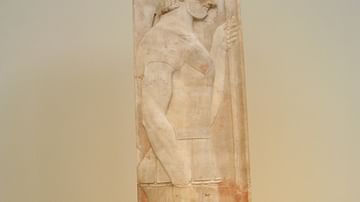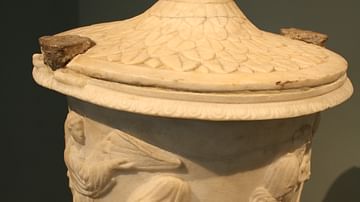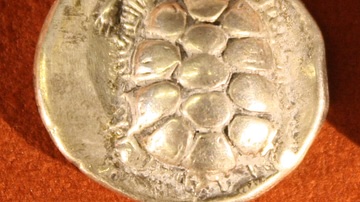Search Articles
Browse Content (p. 140)

Article
Minoan Frescoes
Frescoes are the source of some of the most striking imagery handed down to us from the Minoan civilization of Bronze Age Crete (2000-1500 BCE). Further, without written records, they are often the only source, along with decorated pottery...

Article
The Eleusinian Mysteries and the Bee
The fifth century BCE Greek historian Herodotus relates the importance of bees in ancient Greece, pointing out that the honey of neighboring countries was made using fruit, while the honey of the Greeks was produced by bees. The significance...

Article
The Phoenician Alphabet & Language
Phoenician is a Canaanite language closely related to Hebrew. Very little is known about the Canaanite language, except what can be gathered from the El-Amarna letters written by Canaanite kings to Pharaohs Amenhopis III (1402 - 1364 BCE...

Article
The After-Life In Ancient Greece
In ancient Greece the continued existence of the dead depended on their constant remembrance by the living. It was understood that the soul lived on after bodily death in the realm known as Hades; but that land had different regions the soul...

Article
The Eleusinian Mysteries: The Rites of Demeter
The Rites of Eleusis, or the Eleusinian Mysteries, were the secret rituals of the mystery school of Eleusis and were observed regularly from c. 1600 BCE - 392 CE. Exactly what this mystic ritual was no one knows; but why the ancient Greeks...

Article
The Island Kingdom of Aegina: The Old Gods Still Whisper Their Truths
Today, traveling an hour by ferry from Piraeus, the port of Athens, the first remnant of Aegina's great past a visitor will see is the lonely pillar of Apollo rising from the trees on the hill of Kolona. Once a splendid complex of three buildings...

Article
Protagoras of Abdera: Of All Things Man Is The Measure
Protagoras of Abdera (l.c. 485-415 BCE) is most famous for his claim that "Of all things the measure is Man, of the things that are, that they are, and of the things that are not, that they are not" (DK 80B1) usually rendered simply as "Man...

Article
Protagoras's Paradox
The sophists in ancient Greece were a class of teachers who, for a fairly high fee, would instruct the affluent youth in politics, history, science, law, mathematics and rhetoric as well as the finer points of grammar and history. They professed...

Article
Sumerian Civilization: Inventing the Future
Imagine something that has never been thought of before. If one holds a book in one's hands, one can imagine an e-book, a large-print book, a picture book, all kinds of books. But how does one imagine a book in a world where even the concept...

Article
Passing of Philosophy to Religion: The Death of Hypatia
The death of the philosopher Hypatia of Alexandria (l. c. 370-415) has long been considered the "passage of philosophy to religion", exemplifying the transition from the pagan values of antiquity to those of the new religion of Christianity...